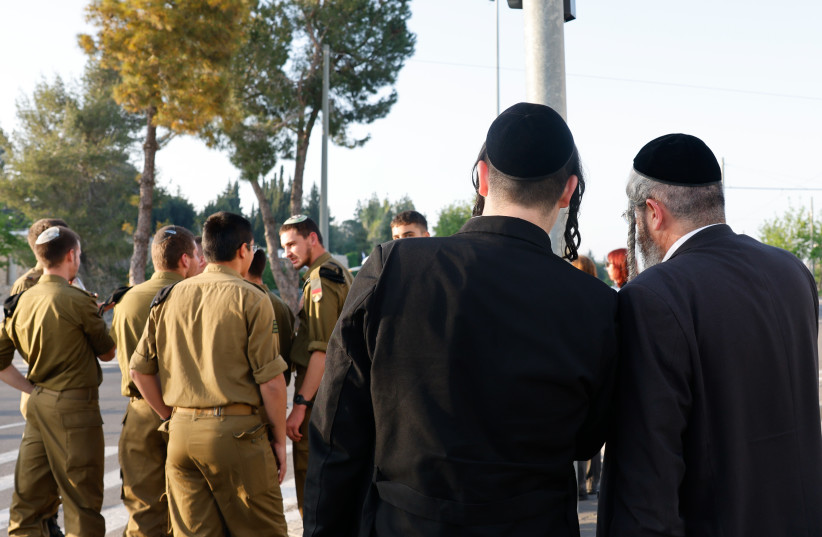Over 3,000 ultra-Orthodox men reported during the last 10 days at recruiting offices throughout the country, a large number of them in Jerusalem. It is the same recruitment office where, until now, almost all young haredim have been going to receive military exemption, as per the government coalition’s agreements. But now, motivated to participate in the war effort, many are volunteering to enlist.
It started with a tiny trickle and turned into a kind of flood. More and more ultra-Orthodox young people, most of them beyond conscription age, are packing a bag and reporting to a conscription office in their area of residence, some of them accompanied by their family that encourages the step.
What has caused this phenomenon, which less than a month ago would have been unheard of? Well, the reasons are varied, but at the root of all this change is one clear position: the growing feeling among the haredi public – Lithuanians and Hasidim alike – that it is impossible to stand by and do nothing after the massacre of October 7 and the war effort that is mobilizing the entire country.
“I feel that the country is in danger, and that’s why I come to do my part,” said Tzviki, a married father of three. Like many others, Tzviki, a 27-year-old resident of the mainly ultra-Orthodox suburb of Ramat Shlomo, is over the draft age.
The phenomenon is indeed exciting, but it is important to clarify the situation.

Haredim are volunteering in the IDF, but not drafting
Most of these new ultra-Orthodox recruits no longer attend yeshiva full time, having passed the maximum age for enlistment. Upon reaching the age of 26, they receive a permanent exemption, and a large number of them leave the yeshiva and go to study for a profession or to work.
“I work, so it is easier for me,” Tzviki explained. “I’m not sure that if I were younger and still studying at the kollel [institute for full-time, advanced yeshiva studies], I would rush to leave the yeshiva to enlist – because we believe that Torah learning is what sustains the people of Israel in the face of danger.”
The new recruits over the age of 26 undergo a demobilization process in two tracks. One route includes two weeks of training, and then regular entry into the reserves in frontline positions such as drivers, equipment transfer, military logistics, and enlistment in the IDF medical system.
There is another route that does not require two weeks of basic training: The recruits immediately enter the IDF’s frontline services in a variety of professions, including in the medical corps – if they are medics, doctors, social workers, or psychologists.
Yoel Tzur Brim, Haredim Affairs reporter at Galei Tzahal and one of the first to report on the phenomenon of the ultra-Orthodox showing up at the recruiting offices, believes this is a significant development in terms of numbers. More haredim have enlisted in the last two weeks than in any haredi recruitment program in an entire year.
Asked whether this is the first swallow that heralds a deep and broad change in ultra-Orthodox society regarding recruitment to the IDF, Brim hesitated and then responded that as long as it is not about recruiting younger yeshiva students, it is an important and even exciting phenomenon – but a marginal one. “The rabbis are silent – they don’t want to encourage the recruits lest it encourage many more to enlist. On the other hand, they don’t dare to criticize the phenomenon because the current atmosphere in Israel does not allow it, and they understand the situation.”
What all this means is that as long as haredim of draft age do not leave the yeshiva in large numbers, this is not a significant change. “Except for the fact that it creates a different atmosphere – of the legitimacy of solidarity with the [other] Israeli, and this is also significant,” Brim concluded. ❖
